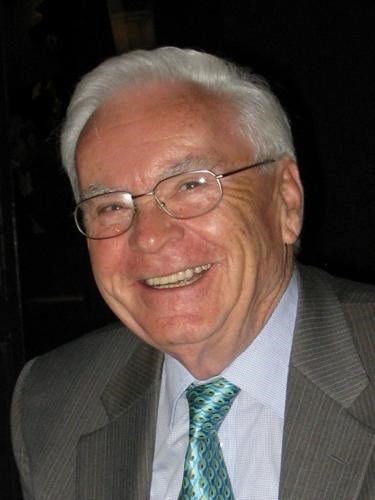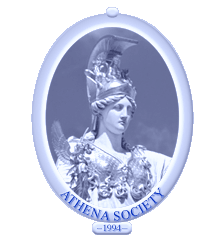Fallen Heroes - In Memoriam
Dr. Basil Thomas Doumas, Ph.D.
(July 16, 1929*-May 12, 2025)
 * The year was changed to 1930 in official records by his father, Thomas, to give him more time for his studies before military service.
* The year was changed to 1930 in official records by his father, Thomas, to give him more time for his studies before military service.
Basil Doumas, one of the founders of the Athena Society, died peacefully on May 12, 2025 in Mequon, Wisconsin.
He was preceded in death by his daughter Vickie Doumas Alafouzos on April 3, 2025, and his brother, Damianos in July 2007. He is survived by his wife Maria, son Thomas, daughter Iphigenia (Genie) Smith, 7 grandchildren and 7 great grandchildren.
Basil was born on July 16, 1929 in Argos Orestiko, Greece, a village in the historic region of ancient Macedonia in Northwestern Greece.
In 1947 his family relocated to Thessaloniki, where he finished high school the same year. He then studied chemistry at Aristotelian University of Thessaloniki where he received his B.S.degree on Oct 12, 1952, and then left for the army as a second lieutenant. While in the army he was sent to a gunpowder plant where he did quality testing of alloys, powders and explosives. He visited a biochemist in Athens and then, in the fall of 1956, began to apply to biochemistry programs in the U.S. Dempsey Morrison at the university of Tennessee offered him a job with the possibility of a fellowship later.
Greatly aiding his application was a glowing letter from Buell F. Maben, chief of the UNRRA (United Nations Relief and Rehabilitation Administration) Mission to Greece during WW2. Basil had advised him to reject some materials after he tested their quality. Then, as now, nobody forgets Basil.
On June 2, 1957, he married Maria Kosma and then they emigrated to Memphis TN in the United States two weeks later. When they arrived in Memphis late at night, there was only one person at the station, Dr Morrison. Basil earned his M.S. degree (1960) with Morrison then his Ph.D. (1962) Degree in biochemistry with Homer Gates Biggs Ph.D. as his advisor.
From 1962 until 1964 he was director of clinical chemistry in the department of pathology at Baptist Memorial hospital in Memphis.
In 1964 he followed Biggs to the Pathology and Biochemistry departments at the University of Alabama Medical College where he was assistant professor (1964-1968) then associate professor(1968-1970) and associate director of clinical chemistry at university hospital.
In 1970, Dr Jon Vidalin Straumfjord Jr. the chair of his department, moved to the Medical College of Wisconsin and asked Basil to join him. Which he did and stayed on the faculty of MCW full time until 1990 and then part time until 2000.
Basil had an active professional life in both research and service to the profession. His research centered on measurement, standardization and interpretation of total protein and bilirubin in blood. He was a member of the AACC (now ADLM) starting in 1963 and the chair (1987-9) of its committee on standards, a member or chair of its awards commitee,1985-9, chair of the international relations committee,1990 and president 1992. He received the Sam Natelson award from the Chicago section of AACC in 1979 and the AACC Award for Outstanding Contributions to Clinical Chemistry in a Selected Area of Research in 1983. His interest in standardization led to him being involved in the National Committee for Clinical Laboratory Standards (NCCLS) for many years, including serving on its board of directors.
Basil brought joy to many of his colleagues and their spouses and stories related by him often became classic Basilisms.
A few examples come to mind....
At a meeting in Australia Basil was with a number of us in a hotel lobby preparing to leave and Basil said Maria was coming soon. Basil had brought down her suitcase which had been in the doorway of their room thinking that she left it for him to bring down. When she finally came down, it turned out that she did not have her room key which was needed to open a closed room even from the inside. She had left her suitcase in the doorway to keep the door from locking while she finished getting ready and had to call the front desk to come open the now closed door.
I also recall a conversation at a meeting of the executive committee of the board of editors of Clinical Chemistry. Discussion at the meeting turned to the suggestion that the journal consider using S.I. units. Basil got very excited and exclaimed that a small group in Europe was trying to make everyone use names and units which would just confuse things. At some point, Dave Bruns the current editor stated that he had already changed the information for authors that the journal would use S.I. Units. At this point Basil became even more animated and exclaimed that this change "violated my civil rights". Everyone, eventually including Basil, cracked up with at least one person falling off their chair!
On a different occasion, we were ready to start a meeting of the journal executive committee and Basil was not there yet (he was never an early riser). When he got there he said it took longer to get his breakfast in the dining room (there was another group meeting at the hotel). During a break a few of us were talking and someone came up with the idea of having room service delivered to Basil the next day. The meal created for him was grits and oregano. Basil came to the meeting the next day looking quite happy and thanked us for the good breakfast.
Jack Ladenson recalled that when he told Basil that he would be becoming a grandfather for the first time, Basil noted that "The child of my child is twice my child" Basil also noted that there were 2 things a Greek could not hide. A cough and money.
For additional info about Basil , an article in the Inspiring Minds series by Misia Landau (Clinical Chemistry 2017,63:5,939-943) about him is strongly recommended.
